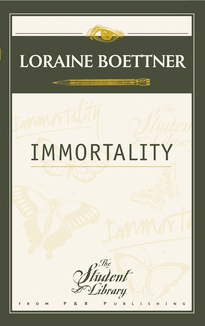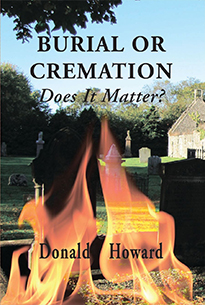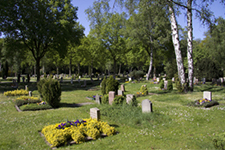What is the right method for disposal of the body? In the final analysis it is no doubt correct to say that the manner of disposal is not a matter of vital importance. We do not believe, for instance, that in the resurrection there will be any difference between those who are buried in the graves of the earth and those whose bodies were destroyed by fire, or devoured by wild beasts, or drowned in the sea, or blown to bits by the explosion of bombs. Certainly the martyrs who were burned for the faith and whose ashes were scattered by the winds shall arise in the resurrection, and their bodies shall be not one whit less glorious than those of others who received burial. There is no limit to the power of God. He who in the first place made the body from the elements of the earth can bring again the body that has been disintegrated by whatever means. The identical particles are not essential to a resurrection. A sailor buried at sea rises as surely as if he had been expensively embalmed and buried in the family plot.
But this does not mean that there is not a great difference between burial and cremation. Certainly under normal conditions we show much more respect for the bodies of our loved ones if they are tenderly laid away in the earth, under the coverlet of green, in the posture of rest or sleep, and in as good a state of preservation as possible. The body is as really and eternally a part of man as is his spirit, and the resurrection of the body is an indispensable part of his salvation.
We cannot bring ourselves deliberately to take the body of a dear one, only less precious than the soul that it enshrined, and give it to the flames for violent destruction, even though we know that the spirit has departed. If we attach a sentimental value to a Bible or an article of clothing or other keepsake, how much more should we treat reverently the body that has been so much more intimately associated with the person. No matter with what refinements cremation is carried out, it still carries with it the idea of violence and destruction.
In the Bible fire is the type or symbol of destruction, complete and without remedy, the condemnation due for sin. In the sacrificial offering the animal was regarded as bearing the sins of the person, as being under condemnation, and therefore it was consumed upon the altar. In a few cases the bodies of criminals were burnt, to indicate the greatness of their sin and the severity of their punishment. After Achan had brought defeat upon Israel by taking “the accursed thing” that God had forbidden, we read: “And Joshua said, Why hast thou troubled us? Jehovah shall trouble thee this day. And all Israel stoned him with stones, and they burned them with fire, and stoned them with stones. And they raised over him a great heap of stones unto this day,” Joshua 7:25,26.
Another case somewhat similar is that of King Saul. After he had disobeyed God, he was defeated in battle by the Philistines and died a shameful death that was practically suicide. His three sons died with him, and the armies of Israel fled. The Philistines cut off the head of the king, hung his armor in their heathen temple, and “fastened his body to the wall of Bethshan.” We read that “when the inhabitants of Jabesh-gilead heard concerning him that which the Philistines had done to Saul, all the valiant men arose, and went all night, and took the body of Saul and the bodies of his sons from the wall of Bethshan; and they came to Jabesh, and burnt them there. And they took their bones, and buried them under the tamarisk tree in Jabesh, and fasted seven days,” I Sam. 31:10-13.
The narrative shows that the procedure followed in regard to Saul was an abnormal and desperate measure. One Bible commentary says: “This was not a Hebrew custom. It was probably resorted to on this occasion to prevent all risk of further insult …. Burial was the usual Hebrew mode of disposal of their dead,” (Jamieson, Fausset and Brown).
The example of the method that God Himself followed in disposing of the body of Moses should be noted. We read that when “Moses the servant of Jehovah died there in the land of Moab,” that “he (God) buried him in the valley in the land of Moab over against Bethpeor; but no man knoweth of his sepulchre unto this day,” Deut. 34:5,6. God’s method was burial, not cremation.
Abraham purchased a cave in which to lay his beloved Sarah. Jacob buried Leah and Rachel. Abraham, Isaac, Jacob, Joseph, David, Solomon, etc., were buried.
In the New Testament the same teaching is continued. We have particularly the example of Jesus, whose body was reverently embalmed with precious spices, wrapped in a clean linen cloth, and tenderly laid in a tomb. Surely the divine precedent in the burial, not the burning, of His body should be the authoritative example for all Christians. Christians need no other reason for burial than that. The body of John the Baptist was buried, as were also those of all the other New Testament saints whose records are given.
Cremation was thus not the practice of the saints of God in either the Old Testament or the New. Rather it was of heathen origin. The early Christians followed the Jewish custom of burying the dead, and repudiated cremation, which was customary in the time of the early Roman Empire. The church historian, Philip Schaff, writes, “The primitive Christians always showed tender care for the dead, under a vivid impression of the unbroken communion of the saints and the future resurrection of the body in glory. For Christianity redeems the body as well as the soul and consecrates it a temple of the Holy Spirit. Hence the Greek and Roman custom of burning the corpse (crematio) was repugnant to Christian feeling and sacredness of the body.”
Dr. Wm. C. Robinson, of Columbia Theological Seminary, writing on this subject says: “Following the Jewish custom, the Christians washed the bodies of the dead, wrapped them in linen cloths, sometimes embalmed them, and then, in the presence of ministers, relatives and friends, with prayer and the singing of psalms, committed their deceased bodies as seeds of the resurrection bodies to the bosom of the earth. Generally those burials were in sepulchral chambers with square-cornered recesses (loculi) in the walls as burial places. The corpse was wound in wrappings, without coffin, and the openings were closed with tiles of brick and marble. The Christian catacombs, as visible witness to the hope of the resurrection, carried their weight with the Roman people. Indeed, even Julian the Apostate traced the rapid spread and power of Christianity to three causes: benevolence, care of the dead, and honesty.
“The Christian custom was sustained by several texts from First and Second Corinthians. In opposing fornication, the Apostle wrote: ‘Know ye not that your body is a temple of the Holy Spirit, which is in you which ye have from God? and ye are not your own; for ye were brought with a price: glorify God therefore in your body.’ In opposing inter-marriage with unbelievers he reminds the Christians: ‘What agreement hath a temple of God with idols? for ye are a temple of the living God.’ In warning against dividing the congregation, he says: ‘Know ye not that ye are a temple of God, and that the Spirit of God dwelleth in you? If any man destroyeth the temple of God, him shall God destroy; for the temple of God is holy, and such are ye.’ In the great resurrection chapter he finds an analogy between our sowing seed and having them sprout into a living body and our looking for its resurrection in incorruption — glory — power — a spiritual body.”
Dr. Robinson then draws this conclusion: “Brethren, weigh these texts, before you exchange the Christian custom of burying or entombing the bodies that are temples of the Holy Ghost for a custom which primitive Christianity universally rejected. The graves of the saints are sanctified by Christ’s rest in the tomb; and the bodies of believers being still united to Christ do rest in their graves until the resurrection.”1
We can only conclude that the practice of cremation, which in our day seems to be becoming more common particularly in the larger city mortuaries, is anti-Christian and should have no place in the practice of the believer. It has no support in Scripture. The early Church rejected it as a heathen custom, as dishonoring to the body, and as suggesting the denial of the resurrection. Most of those who advocate it in our day are religious liberals or humanists who have little or no faith in the literal resurrection of the body, and not a few of them have either discarded Christianity or never gave serious allegiance to it in the first place.
Strange as it may seem, the passages in the Bible that are appealed to by advocates of cremation are those concerning Achan and Saul. But surely these two incidents do not commend cremation as a reverent and desirable means of disposing of the body of a loved one. Rather they militate against such practice. But so anxious are the advocates of cremation to find some Scripture support that will appeal to Christians that in the absence of any others they resort even to these.
It need only to be said further that in regard to funerals Christians should avoid the ostentatious show so often seen in modern funerals, and should spend only a modest amount that will in nowise impoverish those who remain behind. It is rather noticeable that as a general rule people tend to have elaborate funerals in inverse proportion to the amount of true religion that they have. True Christians will not attempt to emulate the world, which sees in the funeral service only the end of an earthly life, but in full recognition of the Biblical truths concerning death and the future life will seek to give proper respect to the bodies of their loved ones and at the same time to center the attention of those present on the reality of the future life.
Notes:
1. The Southern Presbyterian Journal, July 30, 1952.
Taken from Immortality by Lorraine Boettner ISBN 978-0-87552-146-6, pages 50-55, used with permission of P&R Publishing Co. PO Box 817, Phillipsburg N.J. 08865, www.prpbooks.com.
 Immortality by Loraine Boettner
Immortality by Loraine Boettner
This comprehensive study of biblical teaching regarding death and immortality is available for purchase at Trinity Book Service.
Recommended Reading:
 Burial or Cremation, Does It Matter? by Howard Donaldson
Burial or Cremation, Does It Matter? by Howard Donaldson
How should Christians dispose of the bodies of their loved ones after death? Does the Bible give us authoritative guidance on this question, or are we free to decide on the basis of pragmatic arguments, or even personal taste?
Donald Howard is convinced that the Scriptures do give a clear answer to this question: ‘Burial alone has the endorsement of God’s Word, and that Word, not tradition, sentiment or custom, must direct us in both our living and our dying. It is the writer’s firm belief that burial alone gives specific testimony to the Christian doctrine of the resurrection of the dead.’
This short treatment of the subject is available for purchase at Trinity Book Service.

